How can the strong political pedagogic tradition of the agroecology movement be reconfigured to better address the challenges posed by current processes of urbanisation and the residualisation of agroecological farming? The agenda of an agroecological urbanism explicitly questions whether existing pedagogies for agroecology are sufficiently targeted to equip farmers and food practitioners with the knowledge and skills needed to navigate urban-specific challenges. Meaning: setting up viable community enterprises while retaining agroecological principles of social justice, decoloniality and ecology (i.e. address the specific land access, nutrient sourcing, economic models, intersectional solidarities, and producer-eater dialogues needed to thrive in an urban context).
With political pedagogies of La Via Campesina, there is a strong connection with the peasant identity in resistance to colonial neoliberalism. In terms of urban manifestations of agroecology, therefore, this leaves the question of how political pedagogies in city territories can support positive identity formation in processes of political contextualisation and re-humanisation. Can we imagine political pedagogies specific to an urban agroecological movement, geared at the construction of new subjectivities that can carry the action in a context that differs from the one in which political agroecology has predominantly mobilised until now?
Why Political Pedagogies?
As literature on agroecological transitions well explains, bringing forward transformations requires processes of learning and change able to break the blockages that farmers encounter along the journey from soil to plate. Indeed Agroecology has been defined simultaneously as a science, a movement and a practice (Wezel et al. 2009, De Molina 2012, Holt-Gimenez and Shattuck 2011) and its development has been consistent with the strengthening of communities of practices, the building of new subjectivities and the articulation of political movements. The marriage of agroecology and food sovereignty movements since the Nyéléni process in 2015, has marked even a more consistent pathway of politicisation for agroecology and more direct attempts to address food system transformation.
The urban bias
Practice and scholarship on agroecological pedagogies, however, has focused mostly on farmer to farmer (peasant to peasant) learning and farmer training schools inspired by Freirian pedagogical models and focused on rural contexts and actors (McCune 2019). This focus on the rural and the active disengagement with the urban realm reflects what in the agrarian studies literature has been called the ‘urban bias’: the view that the city/the urban is a site of extraction (of natural, human and financial resources) at the roots of farmers and rural people’s poverty and subjugation, and that the empowerment of the farmers could only happen through the abandonment of precarious jobs in the city and a return to land. This has been detrimental of the capacity to see the urban as a frontier of struggle, a source of alliances and an arena to be reclaimed by the movement (Tornaghi and Dehaene 2019) acknowledging that transforming the food system requires politics capable of transforming simultaneously processes of urbanisation and urbanised ways of life - the way in which we live in cities and relate to nature, food and soils.
Recent scholarship has also been questioning whether political agroecology initiatives were sufficiently outward oriented and linked to broader movements and political processes seeking to achieve broader political transformation (Anderson 2019). The ‘Political Pedagogies’ building block, therefore, addresses the transformative ambition of agroecology, and aims to contribute a critical understanding of how its political pedagogies are fit for equipping farmers and food growing communities to face urban challenges.
Vision & Strategies
“We don’t want to be Stars but parts of constellations.”
Gloria Anzaldúa, The New Speakers
In its idealised form, the Political Pedagogies building block is a grassroots network of organisations and individual activists that share knowledge, feeds new imaginaries, keeps food and farming politicised, circulates transformative knowledge and philosophies (decolonial trajectories, postcapitalist projects, people's knowledge, anti-racist practice, feminist solidarities, etc.) and nurtures agroecological thinking and awareness building. It may develop into locally embedded bottom-up governance for local food democracy / sovereignty, but without losing the autonomy and the spaces for its spontaneous and informal exchange network. These political pedagogies ultimately support processes of political contextualisation, positive identity formation, and re-humanisation, towards forming agroecological territories across urban regions.
Political pedagogies for urban agroecology transform the understanding of the food system from a view that sees it as a commodity, to a view that sees it as central in maintenance of life and healthy ecological relations. This transformation is promoted through a number of actions:
Organisation of public debates and campaigns for the promotion and maintenance of ongoing politicisation of food and farming with emphasis on environmental justice and equitable distribution of resources (for example, debates on energy input reduction, soil preservation, land access and the link between soil, food and health);
Organisation of knowledge exchange initiatives and the creation of an environment where to test, share, and debate new ideas (for example informal farmers-to-farmer learning, seed saving networks, or testing new forms of service delivery, like community composting, or soil health clinics).
Territorial learning programmes that equip communities with skills for developing urban agroecologies- from the practicalities of ecological farming (soil remediation, seed sowing, composting) to political praxis (community organising, anti-racist praxis, municipality engagement), to community enterprise development (business planning, organisation structures);
Constitution of a first point of coordination and political lobbying among grassroots communities (for example to build political campaigns for access to land, soil protection regulation etc.);
Effectively transforming and moving away from capitalist, socially exploitative, resource depleting, ecologically destructive farming practices, through resourcing knowledge and spaces for building just and sustainable prefigurations.
The political pedagogies envisioned here aim to primarily speak to the urban agroecology movement. The key messages for action, offered in this section, were crafted after reflecting on concrete challenges and opportunities together with movement actors. The building block departs from recognising the importance of grassroots political work as independent from institutionalised policy arenas. Indeed, even when political pedagogies end up creating institutionalised networks, it is necessary, for the regeneration of critical thinking, that there are mechanisms for propagating new ideas and interrogating institutional policies from a grassroots and autonomous political base.
The strategising focus of the political pedagogies is on understanding how urban-specific political pedagogies for the agroecology movement unfold, learning how these have been developed in the contexts that turned out to be most deeply transformed, and what challenges have been identified as the most relevant. What lessons can be learnt and how can these help reorient other urban-based agroecology activist communities towards effective pedagogical practices?
Despite this focus, in this section there are however messages that can inform public policy (and political lobbying for public policy) at local, regional and national level especially in terms of equitable resourcing of urban agroecologies. Importantly, whether in a policy, movement or funders’ space, political pedagogies for an agroecological urbanism must explicitly engage with frameworks of decoloniality, feminism and anti-racism as connected to the roots of agroecological knowledge approaches in rural territories. How these manifest in urban territories may shift in mobilisation and activity, yet the principles should strategically align with those clearly outlined in movement discourse i.e. Declaration of Nyéléni.
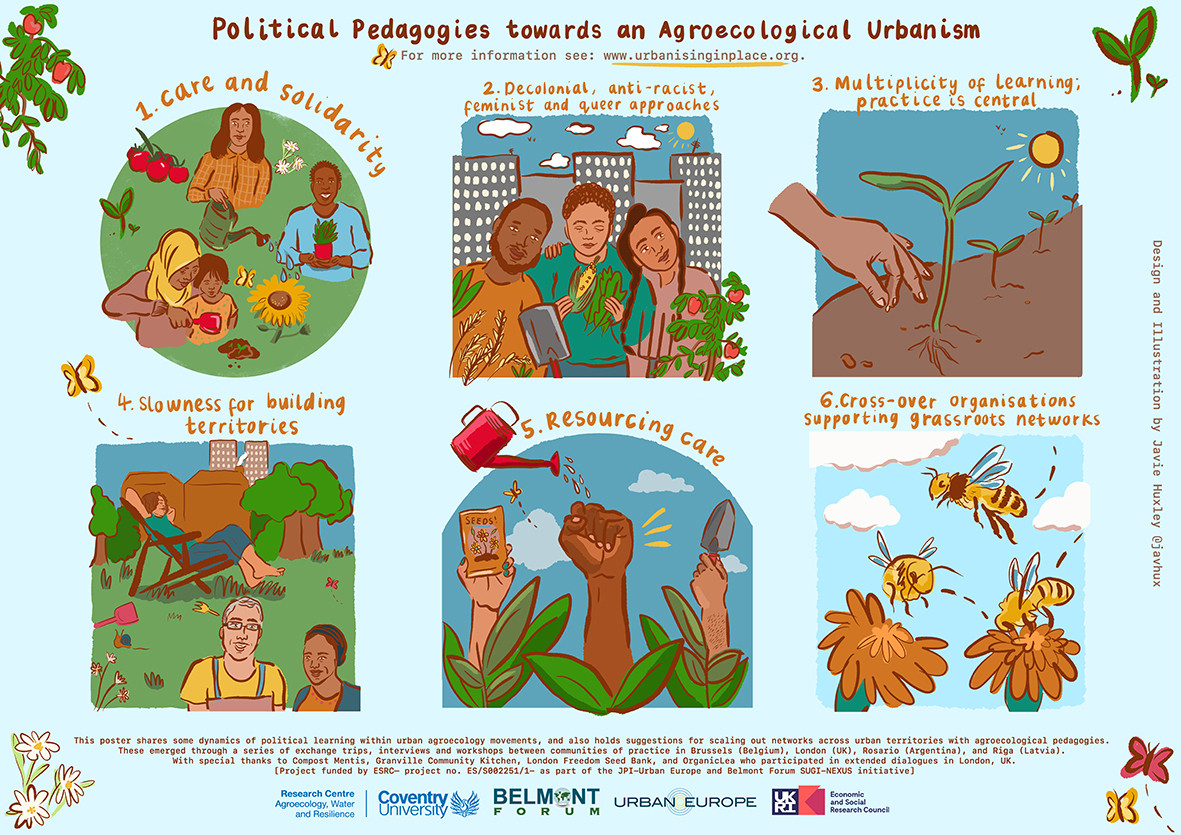
Care and solidarity are critical elements of political pedagogies that embody and evolve an agroecological urbanism
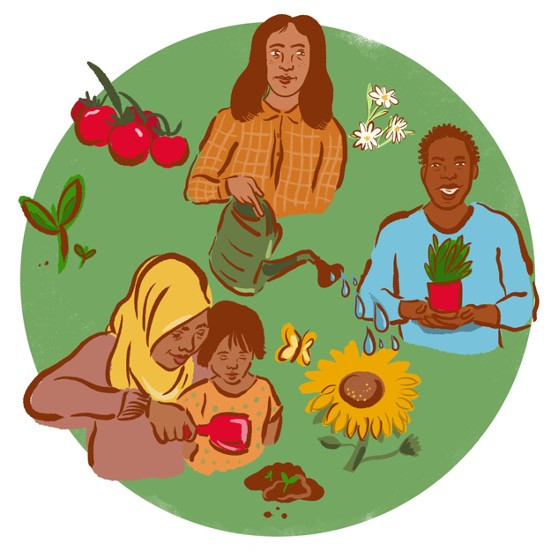
Such foundational praxes can be seen within existing networks in the form of:
Exchange and dialogue through seeds, cooking and practice
Forming networks to generate collectivity through shared values and practices; providing a vehicle for political mobilisation as well as capacity, confidence and a ‘place’
“I think it makes you more confident as well to do in your own job, because you feel there's people behind you or with you even though we're all kind of scattered all over London. But you think it's alright, we're going to do it or whatever, I'm gonna aim for it anyway...But I think the importance of unity and, you know, collective solidarity are so vital, especially when you're trying to do something different, I mean, to grow in confidence. And also to articulate what you think, you know when I go [to Community Food Growers Network gatherings], I think 'that's right, that's what I think!”
- Leslie, Granville Community Kitchen
Building urban agroecology movements that engage with the political, social and cultural aspects of food, as well as developing food growing practices
“I think in terms of agroecology, and even urban agroecology, people are still thinking well growing or farming methods are not understanding that agroecology is this wider thing that includes the social, it includes the political, it includes the cultural aspects of all that is food. Yeah. So is that we are building this agroecological movement, even if we don't call it that.”
- Deirdre, Granville Community Kitchen
Decolonial, queer, feminist and anti-racist practices are critical to develop political pedagogies beyond colonial knowledge binaries that underly current oppressions in the food system
“It is that big ecology of care, I would also say it’s a queering ecology. And by queer I mean about disrupting and dismantling white European straight male frameworks and contexts. And so we are decolonial in practice, and we go beyond just being feminists, as I said we’re queer and spiritual because a lot of us are coming with spiritual practices and beliefs. And so for us that solidarity is collective in arriving at collective understanding and values and each others offering something.”
Deirdre Woods, Granville Community Kitchen
The foundations of the modern agri-food system are in European colonial projects that have violently tried to destroy indigenous land, land practices and foodways. And so disrupting and dismantling white-supremacist, patriarchal and euro-centric knowledge structures is integral to forming agroecological economies and localised distribution networks. In terms of developing urban agroecologies, this includes the binaries of human vs. nature, urban vs. rural that underlie urban hegemonies and limit the ways of imagining and developing cities as agroecological places. Practices that support the collapsing of historical binaries, through processes of political contextualisation of urban life, re-humanisation, and positive identity formation, are critical to developing urban agroecologies.
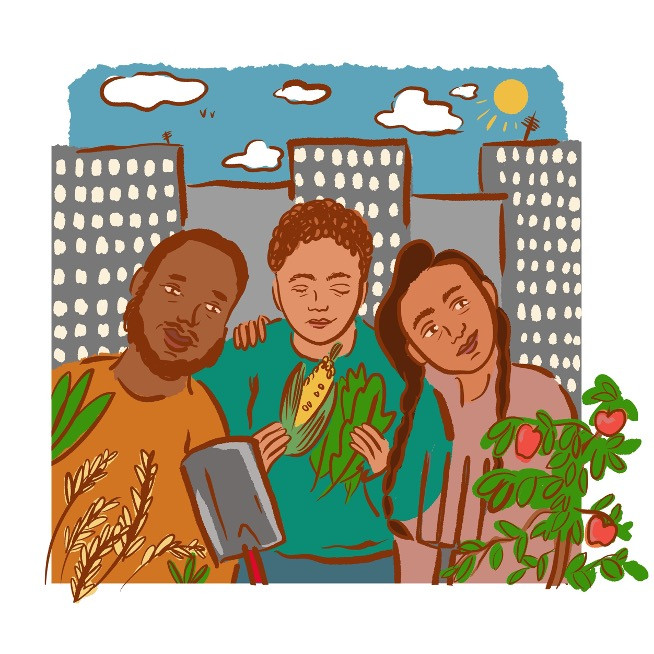
Disrupting and dismantling colonial binaries therefore is necessary to imagine and understand the urban as agroecological through symbiotic practice of care and more-than-human solidarities. Traditional and indigenous knowledge and land stewardship practices offer some hope for the agroecological city and understanding the urban as nature. In the face of eco-techno fixes that propagate city business as usual- an emphasis on environmental justice is vital with developing democratic learning processes that emphasize agroecological roots of social justice, anti-racism and equity as part of ecological work.
“The main thing I wanted to talk about was that a very specific history has led to our current food system and this separation from nature. The industrial agrifood system was made possible by the enslavement of African peoples, violent domination and destruction of indigenous lands and foodways and exploited labour, largely in the US we use people of colour, a lot of immigrant labour, and so greater calling out of that erasure of indigenous knowledge and imperialism and violence and exploitation for profit. And despite this, I think it has been the resilience of communities, especially communities of colour and indigenous communities that are working tirelessly to preserve their knowledge and their land stewardship practices that offer some hope for the agroecological city. t I think there is a specific moment when the separation of nature and humans became dominant and not all cultures have that separation. There’s a reading I have in my class called Reyche Fitz who’s an indigenous scholar who talks about indigenous ways of viewing nature and how nature is urban in some indigenous knowledge ways and we also read about African cosmologies that centre the feminine and the spiritual in ways of knowing the world and so I just want to recognise that.”
- Charisma Acey - University of California
"And one of the things again in Europe that we need to guard against and the UK slightly better but not that much better, is that Britain and Europe are falling into this post-racial idea that Britain is beyond race. So if you look at the recent reports that have come out of Britain, racism is no longer a problem and if it is a problem it resides in the heads of a few naughty people shall we say, rather than a structural product – and that’s coming out of government reports. The grassroots are telling us something different. And it will be interesting how agroecology and urban kitchen spaces, which are predominately racialised areas in the UK – how that responds to that claim and I was really struck by what Charisma was saying that, you know decoloniality, indigeneity, we forgot to talk about racism, and there’s a bit of an erasure in that. And I just reflect on Angela Davis quote, “In a racist society it is not enough to be none racist we must be anti-racists. And I wonder how we navigate that, as well as claiming, communities claiming their own identity around class as well. So I think that’s really interesting to see how agroecology deals with that.”
- Jasber Singh - People’s Knowledge Collective, Centre for Agroecology, Water and Resilience
Political pedagogies promote a multiplicity of learning approaches where practice is central to dialogue across different ways of knowing

Diálogo de Saberes – roughly translates to ‘Wisdom Dialogues among different knowledges and ways of knowing’) – are a central feature to rural agroecological learning in La Via Campesina. Understanding how Diálogo de Saberes translates to urban spaces through Freire-inspired popular education methods (Freire 1970) could be key to unlocking new forms of solidarity and political mobilisation in an agroecological urbanism .
The development of learning approaches tailored to engage in diverse and layered ways of knowing (emotional, relational, memory, spiritual) is an essential element of urban agroecology’s pedagogies. One-to-one mentoring, training the trainers, holding political dialogues, and practical approaches are often named as more suitable to cater to the different life experiences of people that have rejected homogenising and homogenised approaches to learning. Co-learning, learning by doing and creative approaches, the affinity between conviviality, social gathering and learning, offer a range of opportunities to build meaningful context to make-sense together. There is, however, a perceived need to invest more explicitly and intentionally in political training as part of urban agroecological programmes, particularly in Europe, to build collective political contextualisation and the approaches needed for urban agroecology such as anti-racist practice.
In taking inspiration from MST (Movimiento Sem Terra) schools often based in rural settings, what would urban agroecology schools look and feel like that engage in practice as politics and support burgeoning movements to be based in solidaristic dialogue and transformative learning?
Paulo Freire (1970(1968)) Pedagogy of the Oppressed (Pedagogia do Oprimido), New York: Herder & Herder.
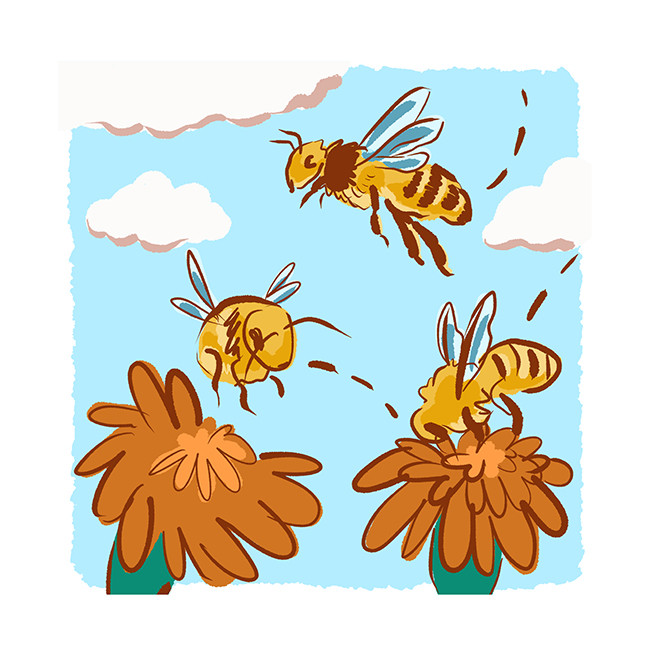
“The word pedagogy is interesting in this, or epistemology is also one, in terms of the ways that we know and what is seen as valid and where the power is in relation to these things. And yeah, there's an ongoing conversation that we have in our different practices about how those things are valued, as well. From experience, or from a practice-based experience, I feel like this co-learning approach is also really effective. And that people really respond to it. And you just connect with people, build relationships, that feel unique, like the space of a workshop, the kind of connections that you can have within that space. That is so because you can create the space of the workshop. And yeah, there's something there's a lot of unexpected things that can emerge from that, that I think are really valuable. And yeah, potentially transformative.”
- Hari Biles, Roving Microscopes / Compos Mentis
Slowness is required in building tranformative territories
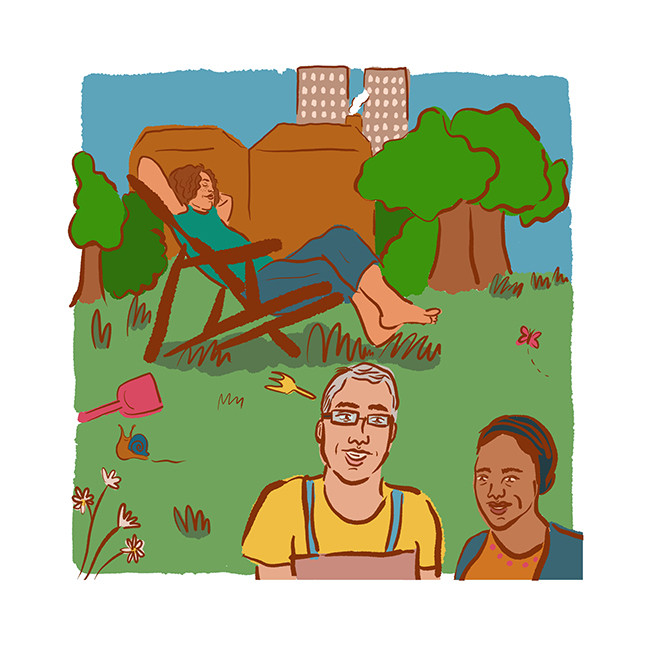
Political pedagogies are built with a slow pace required to incorporate relational dialogic work founded on care, empathy and solidarity, into agroecological work that propagates a critical lovingness. The ability to survive within a neoliberal capitalist environment, exacerbated in an urban context, depends on the ability to carve out space to overcome structural inequalities, to invest in political pedagogies, to find the time and space for all the unlearning and learning needed in transformative politics. Slowness is required to build deep transformative work that expresses broader social justice principles (communicated in global movement spaces i.e. Nyeleni forum) and also connect with the distinctive histories, geographies and cultures of a place. Slowness is an integral part of political pedagogies for an agroecological urbanism; to rebuild a territory through value shifts, reflection, learning and collective action.
“Thirty years in a person’s life is a lot. But it’s nothing for an idea. When we started we were 10 crazy people working on this matter. We were very few. The idea is that this multiplies in every available place in Rosario because Agroecology benefits everybody. [...] It transforms everything, the topic of climate change, the topic of social inclusion.”
- Antonio Lattuca
“We’re trying to do this across the world in all these different contexts and histories and places and somehow we have to preserve the particularities of place even while we’re trying to erase binaries because there is such distinctive histories and geographies and cultures that are really important to agroecology, and agroecological urbanism.”
- Charisma Acey, University of California
An endemic lack of resources limits the development of political pedagogies with care
“When you are stretched, it is exactly the care that becomes really hard to do. And because it is so bad to not do something with care, we will still do so, but that is when the burnout happens. So it is because care is just this unrecognized, it is a classic old thing not to value care work and it is something that is very present in our agroecologies.”
Hari Biles, Compost Mentis
An endemic lack of resources limits the development of political pedagogies with care. Care is central to building more-than-human solidarities across city territories that recognise nature as urban, and are a foundational aspect in the formation of networks to mobilise agroecological food systems. In the context of the neoliberal city, where urban agroecological work often struggles to meet project core costs, and for farmers to pay high rent and cost of living, practitioners are often confronted with painful myriads of self-exploitation, self-care or giving up the ethical ambition to work with care. To be true to values. To build prefigurations of a just and sustainable society. For resourcing the connections already there in the movement. For resourcing the ability to take time to see, recognise, listen and care. Practitioners find themselves between axis of burnout working beyond available resources, and practice with limited embodiment at risk of a thin veil of agroecological values at splintered scales. A lack of resources squeezes the space for practitioners to reflect, strategise and collectivise learning. As the structures of the neoliberal city attempt to chase out cultures of care and solidarity, it is imperative to make space to develop sustainable strategies of care. Social security mechanisms, such as universal basic income or financial supports for farm-start are policy options that could be implemented and part of an agroecological urbanism.
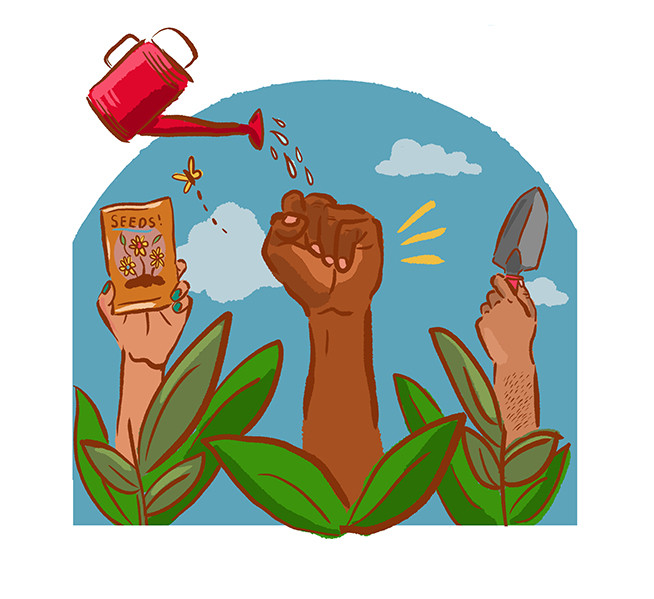
Within movement practice emphasis on developing enterprise models that incorporate solidarity economics with equitable access to all with living wages for food workers can be one strategic focus. And funding bodies can coalesce around regional cooperative banking models that saw success in propagating a strong cooperative movement offering combinations of grants, business loans and business advice, as was the case in the Basque country (Spain) in the 1960’s onwards.
'Cross-over organisations' and umbrella projects can catalyze the distribution of resources for pedagogical work, and protect their autonomy by shielding the scaling-out from cooptive forces and deepening grassroots networks

Their constructive relations with institutions such as political representatives, research bodies, and funders, can allow a continuity of funding and enable a continuity and security of work, which is important to ensure space and time for political pedagogies. The tension here is to not fall prey of extreme compromises in terms of what type of learning/work such funding could enable. For this reason, umbrella organisations strongly aligned with the values of urban agroecology are well suited to provide resources and space in-between projects, necessary to build foundational networks of territorial autonomous movement spaces. Such spaces enable the funding of training across projects, a regular space for building strategies, for promoting co-learning among farmers, for nourishing conviviality, creativity and solidarity that underpin dialogues on everyday experience. Urban agroecology networks have the opportunity to build feminist and anti-racist practice into questions of resourcing political pedagogies, by forming democratic mechanisms that build community wealth and equitable opportunities in efforts to disarm structural cycles of inequity.
“[How is the seed saving programme funded that London Freedom Seed Bank promotes?] So that's from the program level from one of our program funding for the Seed Sovereignty programme. So I don't need to do extra funding for that, and I included six or so different speakers or trainers who share their experiences of different aspects of saving seeds and also because we want to train the trainers more. Have folks able to do seed saving trainings because there's more and more demand it each year we get more and more definitely at the London Freedom Seed Bank, we have to say no to a lot of stuff because everyone's got full time jobs elsewhere or families or other commitments. And so we're trying to train our network, also in hosting our training because they have quite mad seed saving knowledge and it's potentially an extra source of income. And it feels important to value that, build up seed saving knowledge as something valuable as well, being able to evidence this with more and more people coming to us wanting these workshops and us being able to build this network of trainers.”
- Helene, London Freedom Seed Bank
Download the full Political Pedagogies poster here
Acknowledgements
During this research we have engaged in conversations with a number of actors engaged in urban agroecology in different contexts. Some of them have been approached for in-depth interviews and others have been engaged through webinars and workshops. We have also grounded our reflections in our own practices, as some of us are/have been active in these contexts as scholar activists or as practitioners for a number of years. In London, some of these practices include seeds saving networks (London Freedom Seedbank), community kitchens (Granville Community Kitchen), justice-oriented food box schemes (Good Food Box), umbrella organisations and market gardens (OrganicLea), initiatives focused on soil health, composting and alternative infrastructures (Roving Microscopes, Compost Mentis), community food hubs (Wolves Lane), workers coops (London Grown), and many more. In Rosario, we have built on the longstanding experience of the team who has supported the development of urban agroecology from a residualised practice on which people in crisis based their day-to-day survival into a fully supported practice endorsed as a public policy.
Anderson Colin R., Maughan Chris, Pimbert Michel P. (2019), Transformative agroecology learning in Europe: building consciousness, skills and collective capacity for food sovereignty, in Agriculture and Human Values Agriculture and Human Values, 36(3): 531-547. https://doi.org/10.1007/s10460-018-9894-0
Calliste, J., Sivapragasam, S., McDonald, M., (2021) Rootz in Food Growing https://www.ubele.org/rootz-into-food-growing
Declaration of the International Forum for Agroecology, Nyéléni, Mali: 27 February 2015. Development 58, 163–168 (2015). https://doi.org/10.1057/s41301-016-0014-4
De Molina, M. G. (2012) Agroecology and Politics. How To Get Sustainability? About the Necessity for a Political Agroecology, Agroecology and Sustainable Food Systems, vol 37, no 1, pp45-59
Holt-Giménez, E., and A. Annie Shattuck. 2011. Food crises, food regimes and food movements: Rumblings of reform or tides of transformation? Journal of Peasant Studies 38 (1):109–44
Logan, Robert (2021), Evolving urban agroecology with deep democracy: action research in London, UK. Coventry: Coventry University PhD thesis. https://pureportal.coventry.ac.uk/en/studentTheses/evolving-urban-agroecology-with-deep-democracy-action-research-in
McCune Nils, Sanchez Marlen, (2019), Teaching the territory: agroecological pedagogy and popular movements, in Agriculture and Human Values (2019) 36:595–610 https://doi.org/10.1007/s10460-018-9853-9
Pimbert M., Towards a transformative urban agroecology, Urban Agroecology, 15
Pimbert, M. P. 2018. Food sovereignty, agroecology and biocultural diversity. Constructing and contesting knowledge. London: Routledge.
Rosset Peter, Val Valentín , Pinheiro Barbosa Lia & McCune Nils (2019) Agroecology and La Via Campesina II. Peasant agroecology schools and the formation of a sociohistorical and political subject, Agroecology and Sustainable Food Systems, 43:7-8, 895-914, https://doi.org/10.1080/21683565.2019.1617222
Tarlau Rebecca (2013) , The Social(ist) Pedagogies of the MST, EPAA /AAPE, Volume 21 Number 41, p.3
Tornaghi, C. and Dehaene, M. (2020) ‘The prefigurative power of urban political agroecology: rethinking the urbanisms of agroecological transitions for food system transformation’, Journal of Agroecology and Sustainable Food Systems, vol 44, no 5, pp 594-610
Wezel, A., Bellon, S., Doré, T., Francis, C., Vallod, D. and David, C. (2009) ‘Agroecology as a science, a movement and a practice. A review’. Agronomy for Sustainable Development, vol 29, no 4, pp503-515.
Agroecological Urbanism Webinar 3 Part 1 (English) (available soon)